
SCARS Institute’s Encyclopedia of Scams™ Published Continuously for 25 Years

Scam Victim’s/Survivor’s Guide To Writing Your Own Book About Your Experience – For Healing & Profit
For Scam Victims Writing Their Own Story Can Be Cathartic and Healing, But it can also Put Some Money Back in Their Pockets
Scam Victim Support – A SCARS Insight
Article Abstract
Writing a book about your experience as a scam victim can be a powerful way to process emotions, educate others, and potentially recoup some losses. This guide helps structure your book, offering sections to outline your story effectively.
Begin with an introduction explaining the purpose of your book and providing a brief overview of your experience. Then, delve into your life before the scam, detailing the initial contact and setting the stage for your vulnerability. Describe how the scam unfolded, noting any missed red flags and manipulation tactics used.
Share the moment you realized you were scammed and your immediate actions, reflecting on the emotional impact. Discuss your recovery process, including reporting the scam, regaining financial stability, and the support systems that helped.
Offer lessons learned and advice to others, encouraging vigilance and resilience. Conclude with final thoughts and a call to action, motivating readers to stay informed and spread awareness.
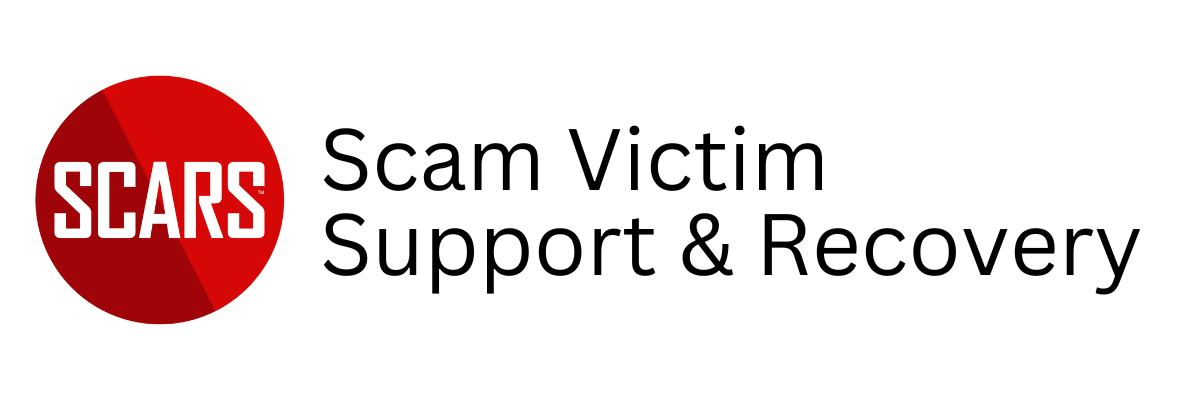
Guide for Scam Victims: Writing a Book About Your Experience – Help to Recover and Put Some Money Back in Your Pocket!
For Scam Victims, writing a book about their experience as a scam victim can be a powerful way to process their emotions, educate others, and potentially help prevent similar scams, not to mention, maybe make back a little money.
Overview
Write simply and descriptively. Your goal is to help the court feel your trauma. While nobody can truly understand what you are feeling, you can help others identify with your trauma by using feeling-evoking words and phrases. Using descriptive words can help people form an image of what you are saying.
This guide will help you structure your book, offering an outline with example sections to guide you through the process.
Your Story Sections
1. Introduction
-
- Purpose of the Book: Explain why you are writing this book and what you hope to achieve.
- Brief Overview: Provide a snapshot of your story to hook readers.
Example:
“I decided to write this book to share my story of falling victim to an online scam, in the hope that it will educate others and provide solace to those who have had similar experiences. My journey is one of betrayal, loss, and eventually, recovery. I want to shed light on the manipulative tactics scammers use and offer practical advice on how to protect oneself.”
2. Before the Scam
-
- Background Information: Share relevant details about your life before the scam.
- Initial Contact: Describe how you first encountered the scam.
- Setting the Stage: Explain your mindset and circumstances that made you vulnerable.
Example:
“Prior to the scam, I was leading a relatively stable life. I had a good job, a loving family, and a secure home. It all started with an innocuous email that seemed to come from my bank, asking me to verify some account details. Little did I know, this was the beginning of a nightmare.”
3. During the Scam
-
- Progression: Detail how the scam unfolded.
- Red Flags: Highlight any warning signs you missed or ignored.
- Manipulation Tactics: Describe the strategies the scammers used to deceive you.
Example:
As the weeks passed, the requests from the “bank” became more frequent and more urgent. They asked for more personal information, which I, unsuspectingly, provided. There were subtle red flags, like grammatical errors in the emails and unusual requests for information, but the sense of urgency and professionalism portrayed by the scammers blinded me to these signs.
4. Immediately After the Scam
-
- Discovery: Share the moment you realized you were scammed.
- Immediate Actions: Describe what you did right after discovering the scam.
- Emotional Impact: Reflect on your initial emotional response.
Example:
5. Recovery from the Scam
-
- Reporting the Scam: Explain the steps you took to report the scam to authorities and financial institutions.
- Financial and Emotional Recovery: Detail your journey to regain financial stability and emotional well-being.
- Support Systems: Highlight the role of friends, family, and support groups in your recovery.
Example:
Reporting the scam was the first step in my recovery. I contacted the police and filed a report with the Federal Trade Commission. My bank was supportive, helping me recover some of the stolen funds. Emotionally, it took longer to heal. I joined a support group for scam victims, which played a crucial role in my recovery. Sharing my experience with others who had gone through similar ordeals was incredibly therapeutic.
6. Lessons Learned and Advice
-
- Personal Insights: Share what you learned from the experience.
- Prevention Tips: Offer practical advice on how to avoid scams.
- Encouragement: Provide words of encouragement to other victims.
Example:
This experience taught me the importance of vigilance and skepticism, especially in the digital age. Always verify the source of unsolicited communications and be wary of sharing personal information. To other victims, know that it is not your fault. Scammers are highly skilled at what they do. Seek support, stay informed, and remember that recovery is possible.
7. Conclusion
-
- Final Thoughts: Summarize your journey and the key takeaways.
- Call to Action: Encourage readers to stay vigilant and spread awareness.
Example:
My journey from being a scam victim to a survivor has been arduous but enlightening. By sharing my story, I hope to help others recognize and avoid scams. Stay vigilant, educate yourself and others, and together, we can fight back against these deceptive practices.
Additional Tips for Writing Your Book:
- Be Honest and Authentic: Your genuine emotions and experiences will resonate most with readers.
- Organize Your Thoughts: Use an outline to structure your book and keep your writing focused.
- Edit and Revise: Writing a book is a process. Be prepared to revise and refine your work. Do a first pass and let someone you trust review it, then add to it.
- Seek Feedback: Share drafts with trusted friends or join a writing group for constructive feedback.
- Consider Professional Help: If needed, hire an editor or a ghostwriter to help bring your story to life.
Writing your book can be a therapeutic and empowering experience, offering hope and guidance to others while helping you process and overcome your own ordeal.
Learn More About This
- https://publish.iupress.indiana.edu/read/crime-victim-stories/section/6e16d16f-6434-4340-8a0b-2f278837ca12
- https://justalternatives.org/victim-survivor-stories/
Note:
- Do not try to tell victims how to recover, lease that to SCARS. But emphasize the importance of the steps you took to recover and the help you received.
- Especially important are the poor decisions you made after your recovery so they can be guides of what not to do.
- To be a reasonable book, your story should be expanded out to about 15-20 letter-sized pages. This can then be reformated for a book of about 45-60 pages.
-/ 30 /-
What do you think about this?
Please share your thoughts in a comment below!
Table of Contents
- For Scam Victims Writing Their Own Story Can Be Cathartic and Healing, But it can also Put Some Money Back in Their Pockets
- Article Abstract
- Guide for Scam Victims: Writing a Book About Your Experience – Help to Recover and Put Some Money Back in Your Pocket!
- Overview
- Your Story Sections
- 1. Introduction
- 2. Before the Scam
- 3. During the Scam
- 4. Immediately After the Scam
- 5. Recovery from the Scam
- 6. Lessons Learned and Advice
- 7. Conclusion
- Additional Tips for Writing Your Book:
- Learn More About This
- Note:
LEAVE A COMMENT?
Thank you for your comment. You may receive an email to follow up. We never share your data with marketers.
Recent Comments
On Other Articles
- on Love Bombing And How Romance Scam Victims Are Forced To Feel: “I was love bombed to the point that I would do just about anything for the scammer(s). I was told…” Feb 11, 14:24
- on Dani Daniels (Kira Lee Orsag): Another Scammer’s Favorite: “You provide a valuable service! I wish more people knew about it!” Feb 10, 15:05
- on Danielle Delaunay/Danielle Genevieve – Stolen Identity/Stolen Photos – Impersonation Victim UPDATED 2024: “We highly recommend that you simply turn away form the scam and scammers, and focus on the development of a…” Feb 4, 19:47
- on The Art Of Deception: The Fundamental Principals Of Successful Deceptions – 2024: “I experienced many of the deceptive tactics that romance scammers use. I was told various stories of hardship and why…” Feb 4, 15:27
- on Danielle Delaunay/Danielle Genevieve – Stolen Identity/Stolen Photos – Impersonation Victim UPDATED 2024: “Yes, I’m in that exact situation also. “Danielle” has seriously scammed me for 3 years now. “She” (he) doesn’t know…” Feb 4, 14:58
- on An Essay on Justice and Money Recovery – 2026: “you are so right I accidentally clicked on online justice I signed an agreement for 12k upfront but cd only…” Feb 3, 08:16
- on The SCARS Institute Top 50 Celebrity Impersonation Scams – 2025: “Quora has had visits from scammers pretending to be Keanu Reeves and Paul McCartney in 2025 and 2026.” Jan 27, 17:45
- on Scam Victims Should Limit Their Exposure To Scam News & Scammer Photos: “I used to look at scammers photos all the time; however, I don’t feel the need to do it anymore.…” Jan 26, 23:19
- on After A Scam, No One Can Tell You How You Will React: “This article was very informative, my scams happened 5 years ago; however, l do remember several of those emotions and/or…” Jan 23, 17:17
- on Situational Awareness and How Trauma Makes Scam Victims Less Safe – 2024: “I need to be more observant and I am practicing situational awareness. I’m saving this article to remind me of…” Jan 21, 22:55
ARTICLE META
Important Information for New Scam Victims
- Please visit www.ScamVictimsSupport.org – a SCARS Website for New Scam Victims & Sextortion Victims
- Enroll in FREE SCARS Scam Survivor’s School now at www.SCARSeducation.org
- Please visit www.ScamPsychology.org – to more fully understand the psychological concepts involved in scams and scam victim recovery
If you are looking for local trauma counselors please visit counseling.AgainstScams.org or join SCARS for our counseling/therapy benefit: membership.AgainstScams.org
If you need to speak with someone now, you can dial 988 or find phone numbers for crisis hotlines all around the world here: www.opencounseling.com/suicide-hotlines
A Note About Labeling!
We often use the term ‘scam victim’ in our articles, but this is a convenience to help those searching for information in search engines like Google. It is just a convenience and has no deeper meaning. If you have come through such an experience, YOU are a Survivor! It was not your fault. You are not alone! Axios!
A Question of Trust
At the SCARS Institute, we invite you to do your own research on the topics we speak about and publish, Our team investigates the subject being discussed, especially when it comes to understanding the scam victims-survivors experience. You can do Google searches but in many cases, you will have to wade through scientific papers and studies. However, remember that biases and perspectives matter and influence the outcome. Regardless, we encourage you to explore these topics as thoroughly as you can for your own awareness.
Statement About Victim Blaming
SCARS Institute articles examine different aspects of the scam victim experience, as well as those who may have been secondary victims. This work focuses on understanding victimization through the science of victimology, including common psychological and behavioral responses. The purpose is to help victims and survivors understand why these crimes occurred, reduce shame and self-blame, strengthen recovery programs and victim opportunities, and lower the risk of future victimization.
At times, these discussions may sound uncomfortable, overwhelming, or may be mistaken for blame. They are not. Scam victims are never blamed. Our goal is to explain the mechanisms of deception and the human responses that scammers exploit, and the processes that occur after the scam ends, so victims can better understand what happened to them and why it felt convincing at the time, and what the path looks like going forward.
Articles that address the psychology, neurology, physiology, and other characteristics of scams and the victim experience recognize that all people share cognitive and emotional traits that can be manipulated under the right conditions. These characteristics are not flaws. They are normal human functions that criminals deliberately exploit. Victims typically have little awareness of these mechanisms while a scam is unfolding and a very limited ability to control them. Awareness often comes only after the harm has occurred.
By explaining these processes, these articles help victims make sense of their experiences, understand common post-scam reactions, and identify ways to protect themselves moving forward. This knowledge supports recovery by replacing confusion and self-blame with clarity, context, and self-compassion.
Additional educational material on these topics is available at ScamPsychology.org – ScamsNOW.com and other SCARS Institute websites.
Psychology Disclaimer:
All articles about psychology and the human brain on this website are for information & education only
The information provided in this article is intended for educational and self-help purposes only and should not be construed as a substitute for professional therapy or counseling.
While any self-help techniques outlined herein may be beneficial for scam victims seeking to recover from their experience and move towards recovery, it is important to consult with a qualified mental health professional before initiating any course of action. Each individual’s experience and needs are unique, and what works for one person may not be suitable for another.
Additionally, any approach may not be appropriate for individuals with certain pre-existing mental health conditions or trauma histories. It is advisable to seek guidance from a licensed therapist or counselor who can provide personalized support, guidance, and treatment tailored to your specific needs.
If you are experiencing significant distress or emotional difficulties related to a scam or other traumatic event, please consult your doctor or mental health provider for appropriate care and support.
Also read our SCARS Institute Statement about Professional Care for Scam Victims – click here to go to our ScamsNOW.com website.


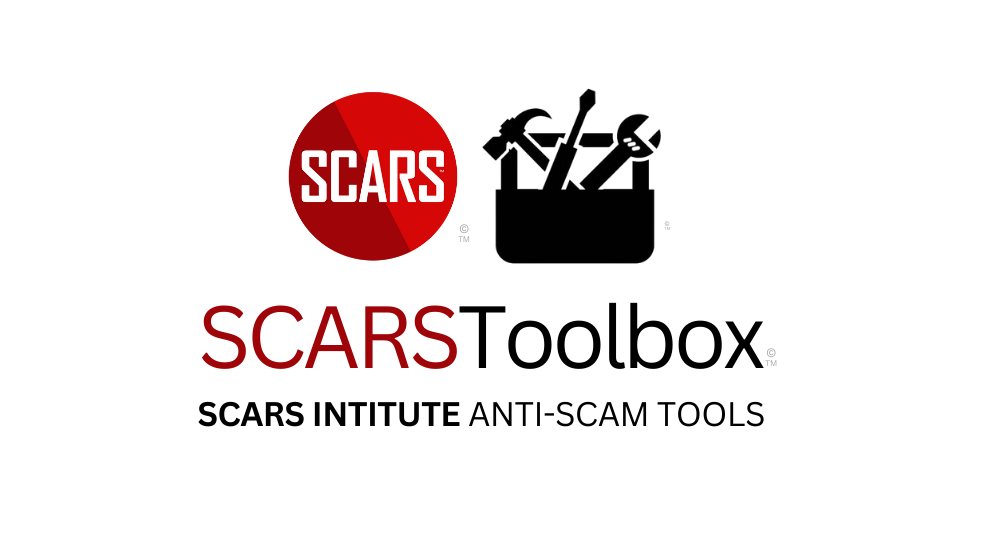

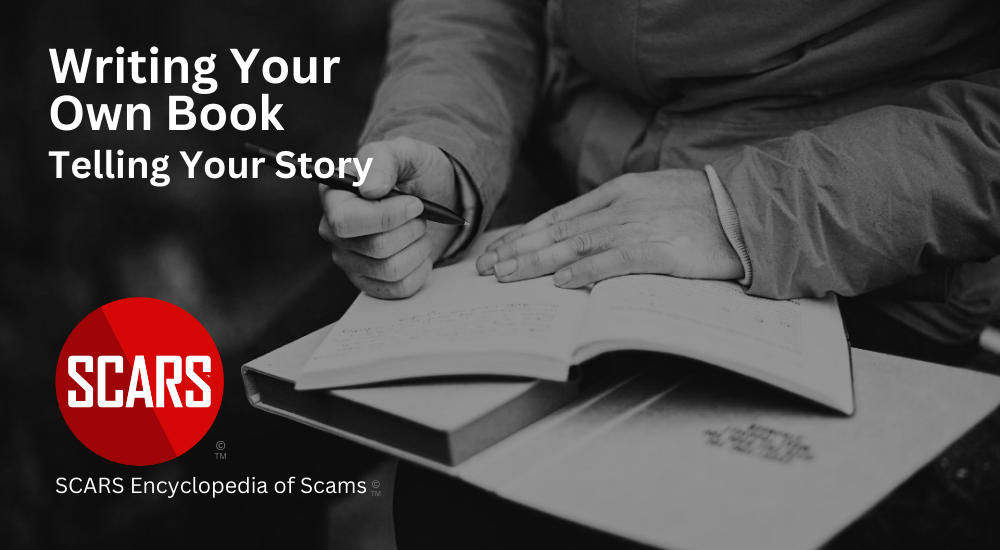


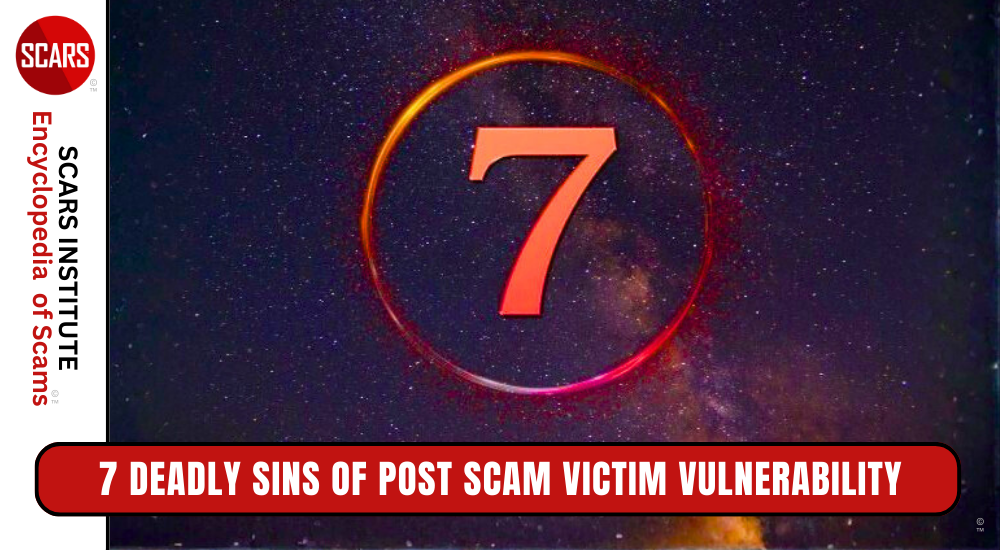
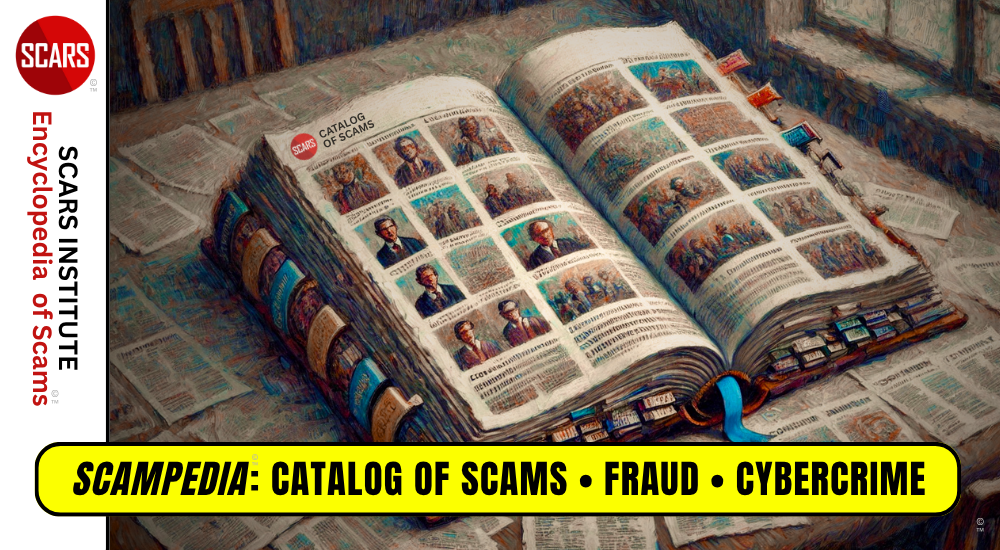
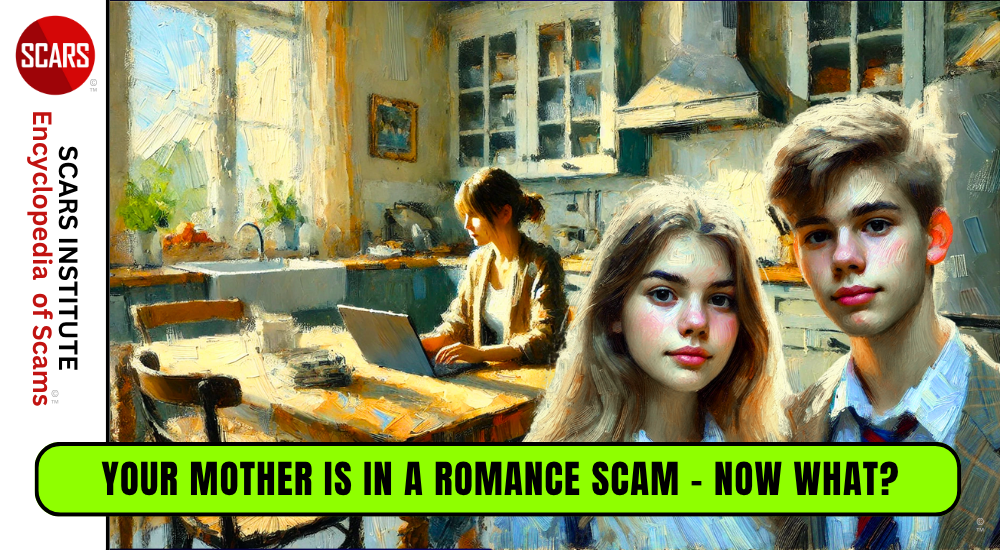
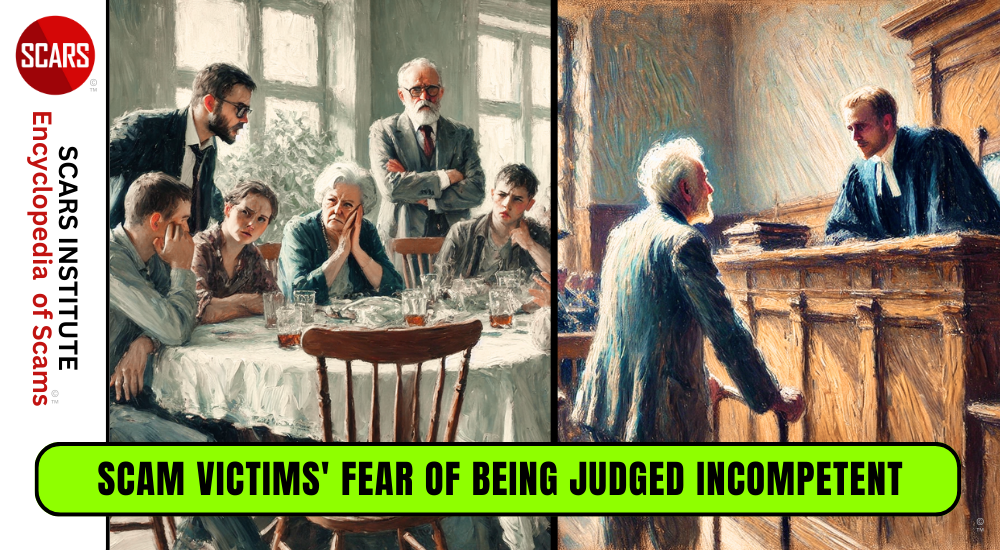
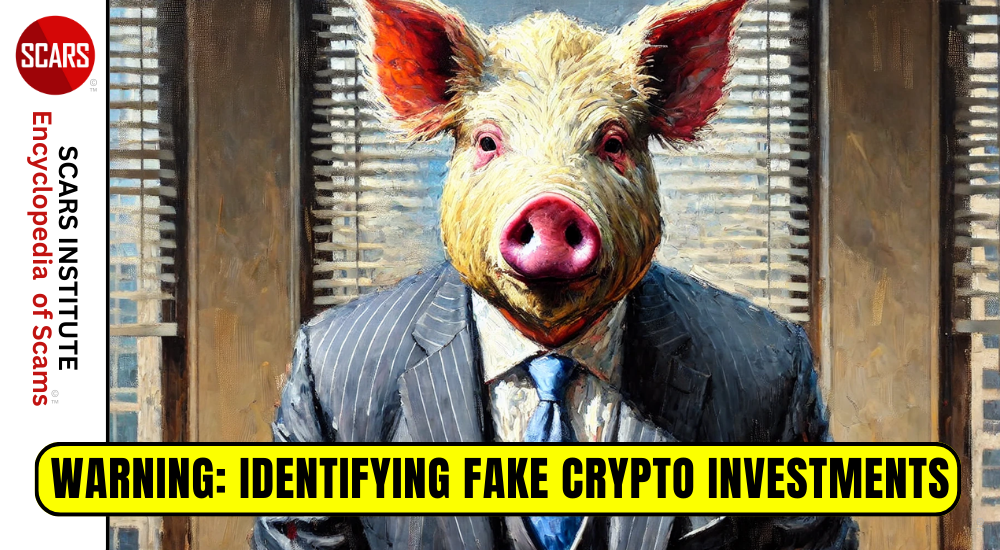




I have a friend who has suggested that I write a book about my story, a few times. Just the last 5 years alone have been trying for me. I do think it would be therapeutic to write it all out, whether it was published or not.
I appreciate the suggested outline in this article. Thank you for the prompts.
This is a concept of processing my emotions I had not considered. However, it will never be. The scammers impersonated a celebrity. This man is elderly, suffering from a chronic illness and is still married to his wife of 68 years with children and grandchildren that could suffer potential consequences. This celebrity’s name would add to the reality of my story and make it more convincing and reliable. I would have to seek legal help and a signed release from the celebrity to be able to relate my story in book form.
I can see how this method would help those who have experienced other types of scam.
I admire those who can go through the process of writing and publishing a book about any subject, especially one this personal,
After documenting my scam and reporting the events to several law enforcement agencies and my bank and a few select family members, I have plenty of material to work with. However, I am pretty burnt out on telling my story. I’m ready to focus on recovery, put the past behind me, and look forward to a brighter future.
I will definitely try to put my experience into a book draft. I feel encouraged to do it!